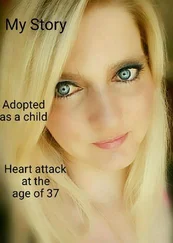Karla Weller - Diagnosis - Heart Attack
Здесь есть возможность читать онлайн «Karla Weller - Diagnosis - Heart Attack» — ознакомительный отрывок электронной книги совершенно бесплатно, а после прочтения отрывка купить полную версию. В некоторых случаях можно слушать аудио, скачать через торрент в формате fb2 и присутствует краткое содержание. Жанр: unrecognised, на английском языке. Описание произведения, (предисловие) а так же отзывы посетителей доступны на портале библиотеки ЛибКат.
- Название:Diagnosis: Heart Attack
- Автор:
- Жанр:
- Год:неизвестен
- ISBN:нет данных
- Рейтинг книги:4 / 5. Голосов: 1
-
Избранное:Добавить в избранное
- Отзывы:
-
Ваша оценка:
- 80
- 1
- 2
- 3
- 4
- 5
Diagnosis: Heart Attack: краткое содержание, описание и аннотация
Предлагаем к чтению аннотацию, описание, краткое содержание или предисловие (зависит от того, что написал сам автор книги «Diagnosis: Heart Attack»). Если вы не нашли необходимую информацию о книге — напишите в комментариях, мы постараемся отыскать её.
A severe heart attack throws the project manager Gerd completely off track. From one second to another, life changes dramatically for him and his whole family. Instead of travelling around the world as a successful business man, he is in need of assistance for everything now.
As a strong-willed person, he fights his way back – just to find out that he cannot accept his new life circumstances.
Diagnosis: Heart Attack — читать онлайн ознакомительный отрывок
Ниже представлен текст книги, разбитый по страницам. Система сохранения места последней прочитанной страницы, позволяет с удобством читать онлайн бесплатно книгу «Diagnosis: Heart Attack», без необходимости каждый раз заново искать на чём Вы остановились. Поставьте закладку, и сможете в любой момент перейти на страницу, на которой закончили чтение.
Интервал:
Закладка:
So I tried to think of alternative ways how to use Gerd’s instinctive reactions for his brain’s rehab and considered bringing a kid’s laptop to the hospital, that Justin had played with years ago.
The display showed pictures and figures and one was supposed to say their names aloud. Or it said English words which the person would repeat in German and vice-versa. Intuitively I thought it would be good training. But then I started questioning everything: what if Gerd was insulted by me bringing him a child’s toy, or even worse, what if Gerd couldn’t operate the child’s toy after all?
Nevertheless, I dug out the yellow-red colored laptop from the garage. It even still worked perfectly after all these years! I tried out a few programs and everything went smoothly. I almost wished the stupid thing had been broken, since that would have made the whole matter moot. Should I take it to the clinic or leave it? Could I handle the disappointment if Gerd couldn’t handle the toy?
A few days later, Gerd’s hiking friends came to visit. They had driven to the Alps with mixed feelings and high expectations. They must have felt a bit melancholy on the drive, since they had just driven the stretch with Gerd a few months prior to go hiking in the mountains and spend a weekend of camaraderie together. This time, they even brought alcohol-free beer with them as a treat for Gerd.
No one ever told me exactly what happened that weekend, but his friends had not been prepared to see Gerd like that. Sure, they knew he needed help, but the fact that his disabilities were so complex was hard for his friends to cope with and very few of them were able to handle it at all.
Even worse, Gerd couldn’t remember his friends’ visit later on. When I asked him if he’d had visitors, he denied. Had his friends given him a gift? What had they talked about? He responded no to all of my questions and when I tried to press him, he only grew angry.
A few weekends later, Gerd received a visit from his friend and supervisor, Robert. He arrived with two huge bouquets of flowers together with get well cards signed by Gerd’s colleagues and the management.
I had encouraged Robert to visit Gerd in the hospital earlier, but he always used the excuse that only close relatives were allowed in the intensive care unit. Robert had experienced his own “ground zero” a few years ago when he was in a coma for a couple of days after having a stroke. So he knew approximately what to expect with Gerd. Now the time had come for Robert to face his own fears and visit his friend and colleague.
That Sunday, my mother and Justin had both joined me going to the clinic. When Robert arrived, Justin met him in the parking lot to show his way to the ward.
Before he was allowed to go into the hospital room, we all had to wait in the hallway while the nurses got Gerd ready, strapped him in to the chair and then wheeled him out.
For some reason, I was terribly nervous. Sometimes, Gerd wouldn’t let the nurses touch him and screamed as they washed and dressed him. Somehow, I constantly had the feeling I had to protect him and make sure he made the best possible impression on the others. If Gerd didn’t recall something or couldn’t say anything, I felt like I had failed personally. Like an over-motivated mother that felt guilty when her child got bad grades in school. For years, I still believed Gerd couldn’t cope with his disability, couldn’t accept his fate, but finally I realized, I couldn’t either!
Whatever Robert may have thought when he saw his friend, he kept it to himself and talked to Gerd as “normally” as he could. I breathed a sigh of relief. Robert was in fact one of the few people who was able to deal with Gerd’s condition. And Gerd was clearly happy to see him and would have loved to return straight to the company with him and start working again.
Although it was fairly cold outside, Robert took Gerd for a walk through the gardens at the rehabilitation clinic and when they returned his face was all smiles. Robert had the feeling Gerd could see very well, since he looked back at the people they ran into and was able to differentiate between men and women! Robert’s positive feedback was proof to me that Gerd really was making progress.
Over the next few weeks, his rehabilitation program was expanded: practicing eating and drinking with therapeutic supervision was now added to the plan. Besides, Gerd also started practicing walking on a treadmill. In order to prevent the risk of falling, Gerd was strapped to the two handles.
Whenever Justin was nearby, he had to assist the nurses with their work. When doing so, the boy usually proved acting far more sensitive than the therapists.
Apparently, time was always too tight so they couldn’t wait until Gerd had gotten into his wheelchair himself, with his feet properly placed on the rests and ready to go. Therefore, once I got to witness as one of them forcefully turned the wheelchair, tipped and pulled it backward when Gerd couldn’t put up his feet right away! I can still see the panic on his face as he suddenly was being jerked down and back and I am convinced that the shock alone nullified the benefit of that therapy session.
Another time, he was carted up a ramp in the wheelchair and was requested to get on the treadmill himself. But it didn’t work, no matter how hard Gerd tried. Two therapists pushed and pulled at him and encouraged him in loud voices, but nothing helped. I could hear them growing angrier and louder as Gerd drew all of his strength together and finally stood up on the treadmill; with the wheelchair up in the air. They had forgotten to release the straps connecting Gerd to the vehicle first! Tears welled up in my eyes and my throat tightened with anger. I wanted to scream at the therapists, but didn’t. They were clearly embarrassed, but they didn’t apologize to Gerd after all.
A few weeks later, Gerd managed to walk on his own again without help! At the same time, his mind became clearer and we often lay together on his bed in the evening and made plans what to do if he could leave the clinic, completely healthy, this very day. As usual, his biggest priority was set on his working life. The very first thing he wanted to do in case of a miracle healing was going back to “his” company, start traveling and visiting “his” customers again.
At one point, we both realized that couldn’t be in his best interest, since there clearly had to be a reason for his heart attack. Now he was given a new life and this time Gerd had to follow a new and better path.
So we thought of alternatives. In our minds we started a company of our own or imagined selling German pretzels from a booth in some exotic country where we both felt comfortable. But no matter where our day dreams took us, it remained always most important to Gerd that Justin did not suffer from his disability. He didn’t want his son to give anything up out of concern for his father.
We just had to accept that Gerd’s disabilities were far more than “just” blindness. They were complex perception disorders in the broadest sense. His mood fluctuated between two extremes. Once, he was full of hope and convinced he would overcome it all and lead a “normal life” again one day and from one minute to the next he would fall into deep despair and his face expressing a look just like “The Scream”, a famous drawing by Edward Munch.

He often was found walking down the hospital hallway and asking passing nurses or visitors where the terminal was. He had to catch an imaginary plane to Paris and just failed to find his way! It was beyond doubt that his job had remained Gerd’s top priority even now; his subconscious wanted to go back to work! Moreover, he often spoke to people in English instead of German. Did he believe himself being on a business trip in his mind?
Читать дальшеИнтервал:
Закладка:
Похожие книги на «Diagnosis: Heart Attack»
Представляем Вашему вниманию похожие книги на «Diagnosis: Heart Attack» списком для выбора. Мы отобрали схожую по названию и смыслу литературу в надежде предоставить читателям больше вариантов отыскать новые, интересные, ещё непрочитанные произведения.
Обсуждение, отзывы о книге «Diagnosis: Heart Attack» и просто собственные мнения читателей. Оставьте ваши комментарии, напишите, что Вы думаете о произведении, его смысле или главных героях. Укажите что конкретно понравилось, а что нет, и почему Вы так считаете.



![Lord Weller - Ритера или опасная любовь [СИ]](/books/421202/lord-weller-ritera-ili-opasnaya-lyubov-si-thumb.webp)








